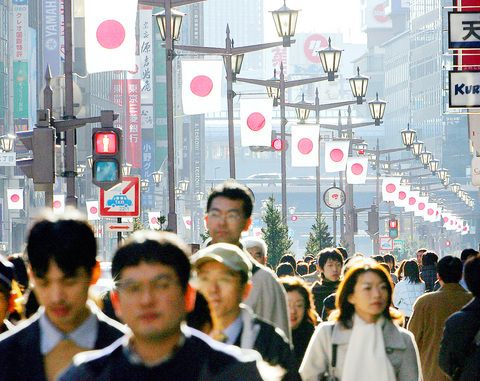Asia's biggest stock exchange finished its final day of trading for the year yesterday on a high note, with stocks rallying to cap a year, during which the benchmark gained 7.6 percent on hopes Japan's economy is on a rebound.
Tokyo Stock Exchange shares closed higher across a broad range of sectors, including banking, retail and export-related issues, as traders and guests clapped hands rhythmically to close the year according to Japanese tradition after a half-day session. The yen was up against the US dollar.

PHOTO: AFP
The Nikkei Stock Average was up 107.20 points, or 0.94 percent, closing the year at 11,488.76 points -- the best finish for the blue-chip index since July 13, when it closed at 11,608.62 points. On Wednesday, the Nikkei lost 42.57 points, or 0.37 percent.
The dollar bought ?103.73 at 3pm yesterday, up ?0.51 from late Wednesday in Tokyo but below the ?103.80 it bought in New York later that day.
On the stock market, investors bought on expectations of a global economic recovery next year.
Technology issues Advantest Corp and Canon Inc and automakers Toyota Motor Corp and Honda Motor Co closed higher. Banks UFJ Holdings Inc and Mitsubishi Tokyo Financial Group Inc also rose, as did major retailer Ito-Yokado Co, as well as real estate Mitsui Fudosan Co.
Many market analysts expect the Nikkei index to rise gradually toward the latter half of next year as global economies recover and production and sales at Japan's major exporters begin to rise.
US Morgan Stanley equities strategist Naoki Kamiyama said if the market factors in the outlook for an end to deflation and a worldwide cyclical economic recovery, the Nikkei "will rise toward 13,000 toward the end of 2005."
Kamiyama said the next year will be the final year of Japan's structural reforms.
Some analysts say the danger of deflation -- or continually falling prices that brings down wages and profits that have plagued Japan for years -- may be over next year. Japan's central bank has kept interest rates virtually at zero for the past three years to help fight deflation.
This year, strong market hopes for an end to deflation helped the Nikkei index climb nearly 17 percent from a year-low of 10,365.40 reached on Feb. 10 to a year-high of 12,163.89 on April 26, but those hopes then gave way to the reality of a slow slide in prices.
For the whole year, the Nikkei gained 7.6 percent from the end of last year on signs the world's second-largest economy has been on the rebound for the last two years thanks to robust exports, especially to China and other Asian countries.

AIR SUPPORT: The Ministry of National Defense thanked the US for the delivery, adding that it was an indicator of the White House’s commitment to the Taiwan Relations Act Deputy Minister of National Defense Po Horng-huei (柏鴻輝) and Representative to the US Alexander Yui on Friday attended a delivery ceremony for the first of Taiwan’s long-awaited 66 F-16C/D Block 70 jets at a Lockheed Martin Corp factory in Greenville, South Carolina. “We are so proud to be the global home of the F-16 and to support Taiwan’s air defense capabilities,” US Representative William Timmons wrote on X, alongside a photograph of Taiwanese and US officials at the event. The F-16C/D Block 70 jets Taiwan ordered have the same capabilities as aircraft that had been upgraded to F-16Vs. The batch of Lockheed Martin

GRIDLOCK: The National Fire Agency’s Special Search and Rescue team is on standby to travel to the countries to help out with the rescue effort A powerful earthquake rocked Myanmar and neighboring Thailand yesterday, killing at least three people in Bangkok and burying dozens when a high-rise building under construction collapsed. Footage shared on social media from Myanmar’s second-largest city showed widespread destruction, raising fears that many were trapped under the rubble or killed. The magnitude 7.7 earthquake, with an epicenter near Mandalay in Myanmar, struck at midday and was followed by a strong magnitude 6.4 aftershock. The extent of death, injury and destruction — especially in Myanmar, which is embroiled in a civil war and where information is tightly controlled at the best of times —

Taiwan was ranked the fourth-safest country in the world with a score of 82.9, trailing only Andorra, the United Arab Emirates and Qatar in Numbeo’s Safety Index by Country report. Taiwan’s score improved by 0.1 points compared with last year’s mid-year report, which had Taiwan fourth with a score of 82.8. However, both scores were lower than in last year’s first review, when Taiwan scored 83.3, and are a long way from when Taiwan was named the second-safest country in the world in 2021, scoring 84.8. Taiwan ranked higher than Singapore in ninth with a score of 77.4 and Japan in 10th with

SECURITY RISK: If there is a conflict between China and Taiwan, ‘there would likely be significant consequences to global economic and security interests,’ it said China remains the top military and cyber threat to the US and continues to make progress on capabilities to seize Taiwan, a report by US intelligence agencies said on Tuesday. The report provides an overview of the “collective insights” of top US intelligence agencies about the security threats to the US posed by foreign nations and criminal organizations. In its Annual Threat Assessment, the agencies divided threats facing the US into two broad categories, “nonstate transnational criminals and terrorists” and “major state actors,” with China, Russia, Iran and North Korea named. Of those countries, “China presents the most comprehensive and robust military threat